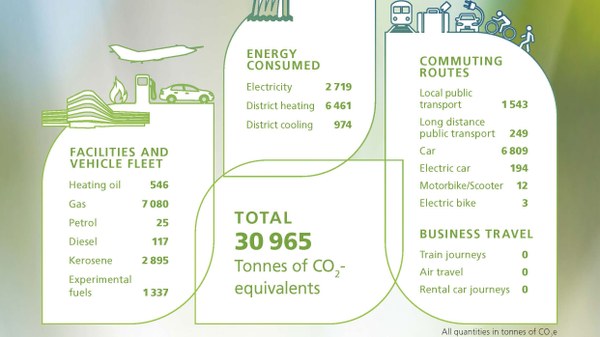DLR greenhouse gas balance for the year 2022

The German Aerospace Center (Deutsches Zentrum für Luft- und Raumfahrt; DLR) has carried out a comprehensive analysis of its greenhouse gas emissions for the third time in 2022. Greenhouse gas accounting is an essential tool for assessing and monitoring environmental impact and plays a crucial role in initiating measures to reduce greenhouse gas emissions. The focus here is on the principle of 'Avoid before reducing before offsetting'.
Use of public transport and electric vehicles on the rise
Compared to the previous year, several important developments were recorded in DLR's greenhouse gas balance sheet. In the area of Scope 1 emissions, including those from facilities and the vehicle fleet, test fuels such as natural gas, propane and paraffin from the Cologne, Lampoldshausen and Stuttgart sites were recorded. In addition, Scope 3 emissions, which include indirect emissions from employee commuting, were calculated for the first time. The results demonstrated that the use of public transport and electric vehicles increased, while the use of individual cars with conventional combustion engines decreased. Measures such as the Deutschland(Job)Ticket, introduced in 2023, and the general development and expansion of e-mobility infrastructure should contribute to further improvements in the future.
DLR's own power generation to grow
The reduced consumption of heating oil and gas at DLR in 2022 is due to cost-saving measures that were introduced in response to the effects of the Ukraine conflict. The use of district heating decreased, but the consumption of electricity and district cooling increased. A new project for photovoltaic systems on buildings and open spaces aims to equip suitable DLR sites with systems for generating renewable energy in order to ensure DLR's own power supply in the future.
Compensation for carbon dioxide emissions
As was the case in 2021, DLR also offset the CO2 emissions generated by business trips and travel in 2022 with the provider atmosfair. The two climate protection projects selected for the scheme were Small Biogas Plants in Nepal and Efficient Stoves in Rwanda, both of which are geared towards a more environmentally friendly energy supply. All atmosfair projects are registered twice, under the Clean Development Mechanism of the United Nations Framework Convention on Climate Change (UNFCCC) and additionally within the Gold Standard for the Global Goals of the Swiss Gold Standard Foundation.
With this final step in the Avoid, Reduce, Offset approach, DLR is forging a path to becoming a climate-neutral research organisation. The continuous monitoring and adjustment of emission reduction measures are crucial to achieving DLR's long-term emission targets. The results of this assessment provide an important basis for identifying further opportunities to reduce environmental impact and promote a climate-friendly working and research environment at DLR.

